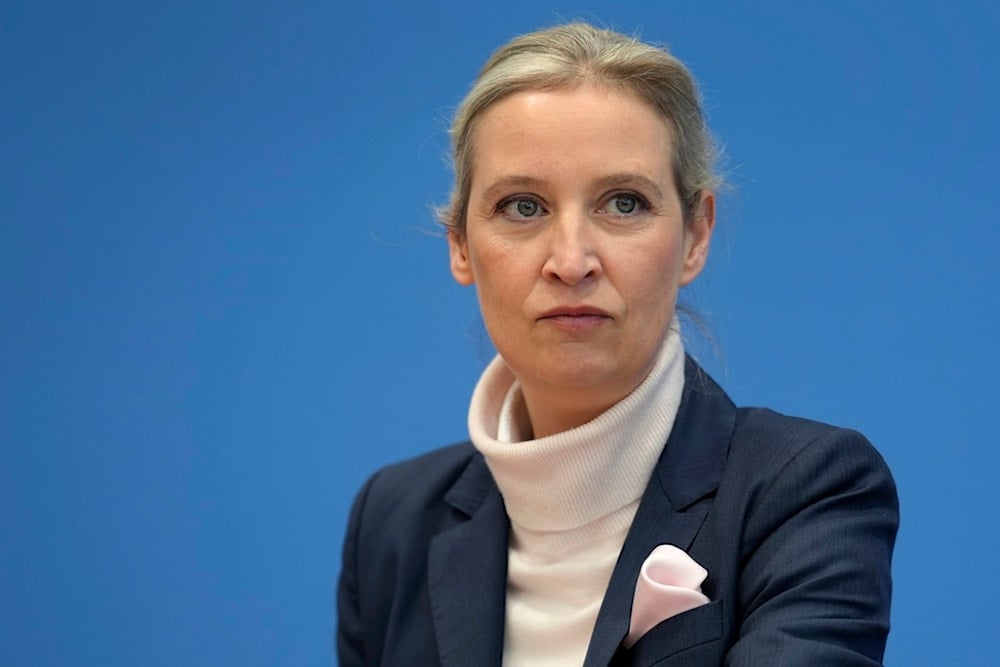AfD excluded from committee chairs, co-chair alleges discrimination
The AfD had expected to receive six committee chairmanships based on proportional representation but was excluded entirely, repeating a pattern from the previous legislative term.
-

Alice Weidel, co-leader of the Alternative for Germany Party (AfD), arrives for a press conference in Berlin, Germany, Monday, Feb. 24, 2025, the day after the national election. (AP)
The right-wing Alternative for Germany (AfD) party is once again accusing the Bundestag of political discrimination after all of its nominees were blocked from assuming leadership roles in key parliamentary committees during this week's elections. The backlash comes amid rising public and legal scrutiny of the party, with tens of thousands protesting nationwide just days earlier to demand its outright ban.
Speaking at a press conference, AfD co-chair Alice Weidel called the outcome a deliberate effort to marginalize the largest opposition force in parliament. "We nominated highly qualified and impeccable people who were not elected due to partial and political arbitrariness and discrimination against the largest opposition force, which is the Alternative for Germany," she said.
Weidel accused other parties of undermining democratic norms: "The other parliamentary factions are damaging the country's democratic institutions and infringing on the rights of over 10 million German voters by voting in such a way."
The AfD had expected to receive six committee chairmanships based on proportional representation, but was excluded entirely, repeating a pattern from the previous legislative term. Committee chairs for budget, legal affairs, and consumer protection were among those filled without AfD involvement.
10 Millionen Wähler werden ausgegrenzt, uns zustehende Ausschussvorsitze nicht besetzt, unsere Kandidaten nicht gewählt. Seit 7 Jahren können wir das Amt des Bundestagsvizepräsidenten nicht bekleiden. Beeindrucken lassen wir uns davon nicht - für uns ist das ein Ansporn! pic.twitter.com/GmbmVV1hJz
, Alice Weidel (@Alice_Weidel) May 21, 2025
Legal precedents and political isolation
This dispute echoes a 2023 decision by Germany's Federal Constitutional Court, which rejected the AfD's challenge over similar exclusions. The court upheld the Bundestag's right to appoint committee leadership at its discretion, reaffirming that party size alone does not guarantee chair positions.
Though the AfD continues to perform strongly in state-level polls, particularly in eastern Germany, it remains almost entirely ostracized by mainstream parties in Berlin.
Critics view the party's inflammatory rhetoric, particularly on immigration and Islam, as incompatible with the democratic order. This ongoing exclusion is widely seen as part of a containment strategy aimed at limiting the AfD's institutional power, even as its electoral base grows.
National protests and extremism label
Just days before the committee vote, more than 7,000 demonstrators filled Berlin's streets, with coordinated protests held in over 60 cities across Germany. Organized by groups such as "Together Against the Right" and "Defend Human Dignity," the rallies called for an immediate ban on the AfD. "There are no more excuses, we demand an immediate ban on the AfD," one speaker declared.
The demonstrations followed a move by Germany's Federal Office for the Protection of the Constitution (BfV), which classified the AfD as a right-wing extremist party earlier this year. That designation, however, has been temporarily suspended by court order pending trial, after the AfD filed a lawsuit. The party's co-leaders called the initial classification a "severe blow to German democracy" and claimed it was a politically motivated attempt to undercut their legitimacy.
▶️ A mass demonstration against the right-wing forces and Alternative for #Germany (AfD) is taking place in #Berlin, a TASS correspondent reports
, Uncensored News (@Uncensorednewsw) May 11, 2025
Initially, the organizers said that 5,000 people would take part in the demonstration. Berlin's police confirmed 4,000 participants… pic.twitter.com/zf9TdcFkfM
While Weidel and her supporters argue they are being shut out of fair representation, others in the Bundestag argue that denying the AfD committee power is a necessary safeguard against extremist influence in democratic institutions.
It is worth noting that Germany’s domestic intelligence agency, the Federal Office for the Protection of the Constitution (BfV), recently announced the temporary suspension of its classification of the AfD as a "confirmed right-wing extremist" organization.

 3 Min Read
3 Min Read









